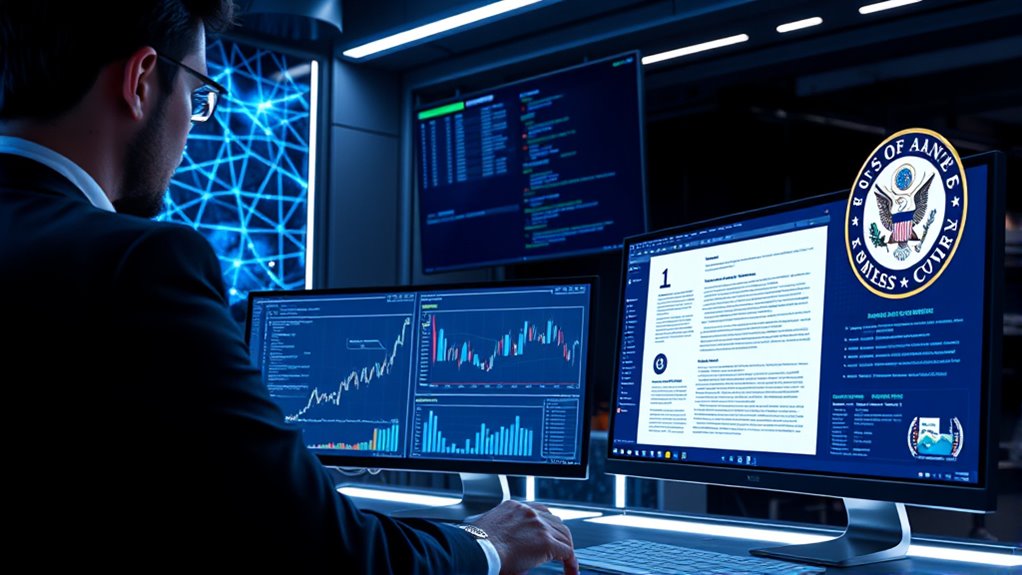The U.S. SEC is cracking down on DeFi platforms by introducing stricter compliance rules focused on transparency and security. You may need to register your platform, implement rigorous KYC/AML protocols, and enhance risk management practices. The regulators are also pushing for industry-wide cooperation and code audits to prevent illegal activities and protect investors. As these rules evolve, understanding their full impact can help you stay ahead—keep exploring to learn more.
Key Takeaways
- The SEC is increasing regulatory scrutiny on DeFi platforms, emphasizing compliance with existing securities laws.
- New rules require DeFi platforms to register with agencies like the SEC and implement rigorous KYC/AML protocols.
- The SEC collaborates with other agencies to develop unified standards and reduce regulatory gaps across the DeFi sector.
- DeFi platforms face enhanced risk management, regular audits, and activity monitoring to ensure regulatory compliance.
- These measures aim to integrate DeFi into legal frameworks, promoting transparency and investor protection.
Expanding Regulatory Oversight on DeFi Platforms

Regulators are increasing their focus on DeFi platforms to guarantee better oversight and compliance. They recognize the rapid growth of decentralized finance and aim to prevent illegal activities, protect investors, and ensure market stability. Agencies like the SEC, CFTC, and Treasury are working together to tighten regulations, pushing DeFi platforms to adopt more transparent operations. This includes requiring registration, implementing rigorous KYC and AML measures, and conducting regular risk assessments. They’re also scrutinizing code and monitoring transactions for illicit activities. By expanding oversight, regulators want to hold DeFi platforms accountable, reduce regulatory arbitrage, and integrate these platforms into existing legal frameworks. This shift marks a decisive move toward greater transparency, security, and compliance within the decentralized finance ecosystem. Additionally, understanding projector technology can provide insights into how transparency and clarity are crucial for effective regulation and consumer protection.
New Registration and Compliance Requirements

To meet the new regulatory landscape, DeFi platforms will likely need to register with agencies like the SEC or CFTC, depending on their services. This means you may have to file registration as broker-dealers or futures commission merchants, especially if your platform facilitates trading or derivatives. You’ll also be required to implement exhaustive compliance measures, including rigorous KYC and AML protocols. Regular risk management programs and stress testing will become mandatory to identify vulnerabilities. Additionally, you’ll need to conduct code audits and continuously monitor for illicit activities. These registration requirements aim to ensure transparency and accountability, making your platform subject to oversight similar to traditional financial institutions. Staying compliant will be essential to operate legally and avoid penalties in this evolving regulatory environment. Incorporating continuous learning about new regulations and technologies will be crucial for adapting your compliance strategies effectively.
Strengthening KYC and AML Protocols

Building on the new registration requirements, strengthening KYC and AML protocols is now a top priority for DeFi platforms aiming to comply with upcoming regulations. You’ll need to implement more rigorous identity verification processes to prevent illicit activities. This includes:
- Mandatory identity checks for new users to verify their backgrounds.
- Real-time transaction monitoring to flag suspicious transfers quickly.
- Enhanced reporting systems to comply with AML regulations and regulatory audits.
Mandatory Risk Management and Code Audits

You need to implement rigorous risk assessment processes to identify potential vulnerabilities early. Regular code audits are essential to guarantee security and compliance, catching issues before they become problems. Monitoring ongoing activities helps you stay ahead of fraud, manipulation, and other illicit activities, keeping your platform compliant. Incorporating automated testing can further streamline quality assurance efforts and improve detection accuracy.
Rigorous Risk Assessment
Regulatory authorities now require DeFi platforms to implement rigorous risk management programs and conduct regular code audits to guarantee security and compliance. You need to proactively identify potential vulnerabilities and ensure your smart contracts are secure. These assessments help prevent exploits, reduce fraud, and maintain market integrity. To meet these standards, you should focus on:
- Conducting exhaustive risk assessments to identify vulnerabilities before they’re exploited
- Implementing continuous monitoring systems for potential threats or suspicious activities
- Performing independent, thorough code audits to verify security and adherence to regulations
- Staying informed about industry best practices for risk management and compliance measures.
Regular Code Audits
To effectively manage risks identified in your smart contracts, conducting regular code audits is a must. These audits help identify vulnerabilities, bugs, or security flaws before they can be exploited. You should schedule audits consistently, especially after updates or new feature deployments, to guarantee ongoing security. Independent auditors review your codebase for compliance with best practices and regulatory standards. This process also verifies that your smart contracts perform as intended, reducing the chances of unintended behavior or manipulation. Regular audits demonstrate your commitment to transparency and security, which regulators view favorably. Additionally, they help you stay ahead of potential legal liabilities by proving proactive risk management. Overall, consistent code audits are essential for maintaining trust, security, and regulatory compliance in the evolving DeFi landscape. Incorporating sound healing science principles into risk assessments can further enhance your understanding of systemic vulnerabilities, ensuring more comprehensive security measures.
Compliance Monitoring
Compliance monitoring has become an essential component of risk management for DeFi platforms, especially with increasing regulatory scrutiny. You need to actively track transactions, detect suspicious activities, and guarantee adherence to regulations like AML and KYC. Failure to do so can lead to penalties or shutdowns. Key aspects include:
- Implementing continuous transaction monitoring to flag illicit activities
- Conducting regular stress tests to identify vulnerabilities
- Maintaining thorough records for audits and investigations
These measures help you stay compliant, reduce risk, and build trust with regulators. By establishing robust monitoring processes, you demonstrate your commitment to transparency and security. Staying ahead of regulatory expectations is vital for long-term success in the evolving DeFi landscape. Regular assessment of your compliance practices ensures ongoing effectiveness and helps adapt to new regulatory developments.
Inter-Agency Collaboration and Policy Harmonization

You should recognize how regulatory agencies like the SEC and CFTC are working together to create clearer, unified rules for DeFi platforms. Their joint efforts aim to reduce conflicting policies and improve oversight across digital asset markets. This collaboration is essential for fostering consistent enforcement and supporting industry growth. Additionally, establishing transparent disclosure policies can help build trust with users and ensure compliance.
Regulatory Alignment Efforts
Inter-agency collaboration is becoming central to shaping a cohesive regulatory landscape for DeFi and cryptoassets in the United States. Agencies like the SEC, CFTC, and Treasury are working together to align policies and reduce regulatory gaps. This effort aims to create a unified framework that streamlines compliance for platforms and protects investors.
Key initiatives include:
- Joint statements clarifying crypto trading allowances
- Coordinated rulemaking for DeFi platform oversight
- Cross-agency efforts to harmonize definitions and obligations
Unified Oversight Strategies
Building on efforts to align policies across agencies, the focus now shifts to implementing unified oversight strategies through enhanced collaboration and harmonization of regulations. You’ll see agencies like the SEC, CFTC, and Treasury working closely to develop consistent rules that reduce gaps and ambiguities in DeFi oversight. They’re sharing information, coordinating enforcement, and jointly crafting standards that apply across platforms. This approach ensures that DeFi operators face clear, predictable requirements, regardless of jurisdiction. By harmonizing policies, regulators aim to prevent regulatory arbitrage and illicit activities more effectively. You’ll notice increased inter-agency communication, joint initiatives, and shared resources, all designed to create a cohesive regulatory environment. This unified strategy helps promote responsible innovation while safeguarding market integrity and investor protection. Moreover, fostering creative problem-solving among agencies can lead to more innovative and adaptable regulatory frameworks.
Implications for DeFi Innovators and Market Dynamics

As regulatory scrutiny intensifies, DeFi innovators face both significant challenges and opportunities that could reshape the market landscape. You may encounter increased compliance costs, as platforms must implement rigorous KYC, AML, and risk management measures. This could slow down innovation but also create a more trustworthy environment.
Be aware that:
- You might need to register with regulators, impacting your operational flexibility.
- Code audits and monitoring for illicit activities will become standard, adding to your expenses.
- Compliance requirements could lead to consolidation or exit for smaller players, shifting market power.
While these regulations may limit some innovation, they also create a clearer framework that could attract institutional investment and foster long-term growth. Adapting now can position you advantageously in a more regulated, stable DeFi future.
Additionally, establishing a cohesive design that emphasizes security and transparency will be crucial in meeting regulatory expectations and building user trust.
Frequently Asked Questions
How Will These Regulations Affect Existing Defi Platforms’ Operations?
These regulations will require you to enhance your DeFi platform’s compliance measures, such as registering with authorities, implementing KYC and AML procedures, and conducting regular code audits and stress tests. You’ll need to adopt stronger risk management programs and monitor for illicit activities more closely. Expect increased operational costs and potentially new restrictions, but also opportunities for growth through greater regulatory clarity and investor confidence.
What Penalties Exist for Non-Compliance With New Rules?
If you ignore the new rules, you could face hefty fines up to millions of dollars or even criminal charges, depending on the severity. The SEC hasn’t specified exact penalties yet, but past violations resulted in significant fines and bans. You might also face reputational damage that could permanently harm your platform’s credibility. Staying compliant isn’t just smart; it’s essential to avoid severe penalties and keep your operations running smoothly.
Will Decentralization Be Compromised by Registration Requirements?
Yes, decentralization could be affected by registration requirements. When DeFi platforms must register and comply with KYC, AML, and other regulations, they may need to implement centralized processes or oversight, which can reduce their decentralized nature. You might find that some platforms could become more controlled or hierarchical, potentially compromising the core principle of decentralization. However, some projects may adapt by designing compliance measures that still preserve their decentralized ethos.
How Are Smaller or Emerging Defi Projects Affected by Compliance Costs?
You might find that smaller or emerging DeFi projects face increased challenges due to compliance costs. As registration, KYC, AML measures, and regular audits become mandatory, these projects may struggle with limited resources. The financial burden could slow innovation or push them out of the market. However, some may adapt by seeking partnerships or focusing on compliance to build trust and attract more users within the regulated framework.
What Timeline Is Expected for Full Regulatory Implementation?
The timeline for full regulatory implementation is like watching a sunrise gradually illuminating a dark landscape; it’s unfolding over the next 1 to 2 years. You can expect phased rollouts, with initial compliance deadlines within the next 6 to 12 months. Expect ongoing adjustments as agencies refine rules, so you’ll need to stay alert and adaptable, riding the wave of change rather than being swept away by it.
Conclusion
As the SEC tightens its grip on DeFi platforms, you’re entering a storm of regulation that’s reshaping the landscape. These new rules act like a lighthouse guiding the industry towards greater transparency and safety, but they also cast shadows of compliance burdens. Staying ahead means adapting quickly and embracing these changes, or risk being left behind in the turbulent seas of innovation. The future of DeFi depends on how well you navigate this evolving regulatory tide.









